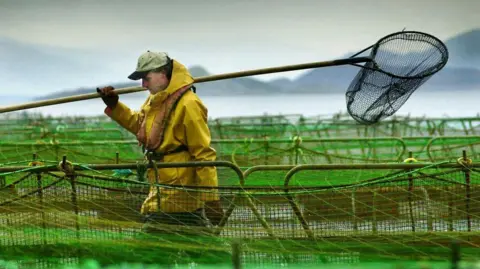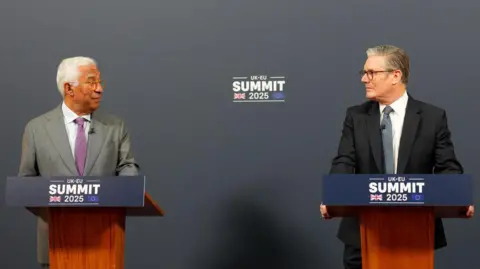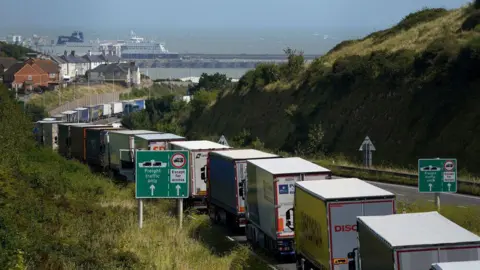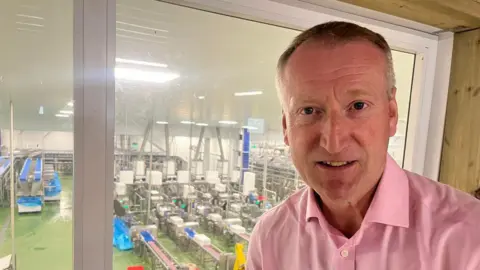What does the new EU deal mean for Scotland?
 PA Media
PA MediaThe new EU deal has been described in Scotland as both a "betrayal" and "breakthrough", and will affect businesses in different ways.
The harshest criticism has come from the commercial sea fishing industry which has reacted angrily to a 12-year extension of the initial post-Brexit fishing agreement.
But the clearing away of red tape could also benefit exports for others in the sector.
So what does the new deal mean for Scotland?
 Reuters
ReutersFishing
The previous post-Brexit deal saw the UK regain 25% of fishing rights from the EU, but it also gave European boats continued access to UK waters.
It was due to expire at the end of June 2026 but the new agreement will see that extended until the summer of 2038.
Elspeth Macdonald, who represents more than 400 fishing boats as chief executive of the Scottish Fishermen's Federation, told BBC Scotland it was a "total capitulation to the EU".
By agreeing to a multi-year deal, she argues, the UK has thrown away an important bargaining chip for future negotiations.
Deputy First Minister Kate Forbes described it as a "great betrayal" of Scotland's fishing fleet.
But the UK government claims the deal provides more certainty and stability going forward, and there will be no increase in the EU quota.
Reduced bureaucracy could benefit west coast creel fisherman who sell directly into Europe and benefit from measures to reduce hold-ups for goods that perish quickly.
Shellfish from some UK waters, currently banned in the EU, can be exported again under the deal.
In an effort to address concerns from the fishing sector, the UK government has also announced a £360m fishing and coastal growth fund to invest in new technology, equipment and support for coastal communities.
Agriculture
A new SPS agreement will make food and drink imports and exports between the UK and the EU easier. SPS stands for sanitary and phytosanitary, which refers to rules about animals and food.
The deal will align UK food safety and animal health standards with those of the EU, meaning most routine checks on animal and plant products will be removed completely.
Prime Minister Sir Keir Starmer said it would reduce "red tape" for businesses and help cut lorry queues at the border.
The UK government said this could lead to lower food prices and more choice on supermarket shelves.
The deal also means that British farms will be able to sell sausages and burgers to the EU for the first time in five years.
It would also return Scottish seed potatoes, once an important export, to the EU market after they were banned in 2021 in the wake of Brexit.
 PA Media
PA MediaPresident of the National Farmers Union (NFU) in Scotland Andrew Connon told BBC Scotland's Lunchtime Live programme he was "cautiously optimistic".
He said it would help the livestock sector, specifically beef and lamb producers, as well as the seed potato industry which had suffered in recent years.
"Since Brexit, there has been more restriction and more friction at borders with regards to exports," he said.
"The likes of the seed potato industry has been massively impacted. So anything that can reduce that friction has to be welcomed."
But Mr Connon also said it was important that standards were not relaxed and the border was kept safe so not to undermine British markets.

Tavish Scott, chief executive of Salmon Scotland, said the deal was "very good news" for fish farming.
He said the EU was the "most important market" for Scottish salmon, with France alone taking about £240m of it every year.
Mr Scott said the sector had faced "considerable" costs for administration to export salmon and delivery time had increased due to physical checks on products.
He added: "These measures could reduce the bureaucratic cost of the administration we currently face, at about £3m a year.
"It will also improve our delivery times to our customers all over Europe, which is very welcome given we're exporting a time-sensitive product directly from Scotland into the EU."
Hospitality
UK Hospitality has praised the deal as "positive news" for the sector.
Chief executive Kate Nicholls said it would help to "further increase access to high-quality, affordable food and drink for business and consumers alike".
 Getty Images
Getty ImagesShe also welcomed the UK government's commitment to working on a youth mobility deal.
It's thought a new agreement on youth movement could increase the UK hospitality workforce after significant staff shortages in the wake of the Covid pandemic and Brexit.
The Scottish Hospitality Group also welcomed the deal as importing products from the EU was a "big cost" for the sector.
Director Stephen Montgomery said the industry body would wait to read the whole document, however "what we do know is that this will not go far enough to the help already struggling hospitality businesses".
He said businesses were still struggling with growing costs due to increased national insurance contributions and the "out of date" non-domestic rates policy.
Defence
The UK-EU deal also includes the announcement of a new security and defence partnership.
The prime minister said this would "pave the way for the UK defence industry to participate in the EU's proposed new £150bn Security Action for Europe (SAFE) defence fund".
 PA Media
PA MediaThat will be welcomed by UK defence firms such as BAE Systems and Babcock which have a significant presence in Scotland, particularly in naval shipbuilding.
The UK government also said the deal would benefit British steel as it would be protected from new EU rules and restrictive tariffs through a bespoke agreement.
Travel
Scottish holidaymakers will soon be able to use more eGates in Europe, which the government says "will end the dreaded queues" at border control.
Since Brexit, British travellers arriving at EU airports have mostly had to queue for manned desks to get their passports stamped, instead of using the automated gates.
As part of the deal, "pet passports" will also be introduced for cats and dogs, so there will no longer be a need for animal health certificates on every trip.
The UK and EU have also agreed to work together on a "youth experience scheme".
This could mean young people, aged 18-30, might be able to travel and work freely within the European Union again.
But the government said the youth scheme would be "capped and time-limited" and would be similar to ones the UK already has with countries like Australia and New Zealand.
The UK has also agreed to work towards re-joining the Erasmus+ scheme, which would make it easier and more affordable for students to study abroad in the EU.
